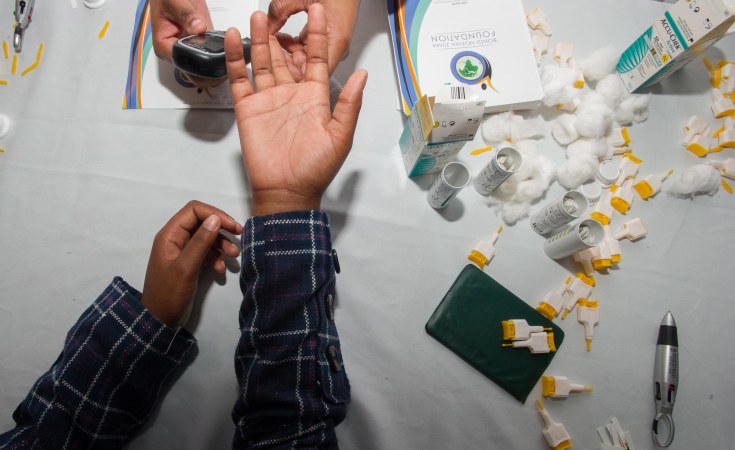Brazzaville — In June 2021, at the height of the COVID-19 pandemic, Emmanuella Selasi Hormenoo, an 18-year-old Ghanian university student, was teetering on the brink of death. "The doctors initially thought that I might have COVID-19, but when they did the tests, they were always negative. During one of the blood transfusions I had to have, I went into cardiac arrest, and slipped into yet another coma."
After three horrific months in and out of hospitals and battling life-threatening complications, including being paralyzed from the waist down for several months, Emmanuella was finally diagnosed with type 1 diabetes. This is the most severe form of the condition which affects around 10% of people living with diabetes. Emmanuella now regularly injects herself with insulin to keep her blood sugar levels normal and give her energy.
Diabetes is a chronic lifelong condition that occurs when the body is unable to produce enough insulin or cannot effectively use the insulin it produces resulting in raised levels of blood sugar. Left untreated, diabetes can lead to complications such as heart disease and stroke, nerve damage, kidney damage, lower-limb amputation, and eye disease that can result in blindness.
There are an estimated 24 million people living with diabetes in in the African region, a figure projected to more than double to 55 million in the next two decades - the highest projected increase worldwide. Estimates show that that only half of the people diagnosed with diabetes are receiving adequate treatment.
"The diabetes challenge in Africa is threefold," explains Dr Maïmouna Ndour Mbaye, head of the Marc Sankalé National Centre for Diabetes Control in Senegal. "First, we have the highest projected number of new cases, worldwide. Second, we have the highest estimated number of people living with the condition without being aware of it, and who are at a high risk of life-threatening complications. Third, we have the lowest investment rate in diabetes care worldwide, at only 1% of the region's health expenditure. Our health systems are designed for acute, infectious diseases, and not enough attention is given to chronic diseases, in terms of infrastructure, equipment and human resources."
To address this, World Health Organization's Regional Office for Africa (Afro) is currently working on the Diabetes Blueprint for Africa, under the framework of the Global Diabetes Compact, the WHO global diabetes control initiative launched in April 2021, on the centenary of the discovery of insulin.
The primary objective of the Global Diabetes Compact is to reduce the risk of diabetes and to ensure that people diagnosed with the condition have access to equitable, affordable, comprehensive and quality treatment and care. At its core, the compact is a comprehensive package representing the sum of all available WHO information and guidelines on the prevention and management of diabetes. It is focused on four principal areas: increasing political will and resources, strengthening health systems, improving access to affordable medicine and technologies, and empowering people living with diabetes.
The Diabetes Blueprint is a strategy to implement the Global Diabetes Compact in the African region, by focusing on the region's needs and particularities and tangibly strengthen diabetes prevention and management. Experts across the region worked alongside WHO Afro technical and medical officers to develop and finalize the Diabetes Blueprint.
Starting with a situational analysis detailing diabetes control programmes in Africa, experts have focused on regional priorities and commitments on diabetes prevention and integration into noncommunicable disease programmes across the region. The experts agree that a common challenge is that many health systems are still dealing with the aftermath of the COVID-19 pandemic which stretched capacities sometimes beyond limits and rendered services for the detection and treatment of chronic conditions such as diabetes scarce if existent at all.
To strengthen diabetes control efforts in high prevalence countries in the African region, several gaps must be addressed. These include myths and misconceptions about diabetes among the public, fragile primary healthcare systems and insufficient capacity and training of healthcare workers. Other gaps include the scarcity and high costs of healthy diets and the lack of advocacy for health, amid gaps in political leadership and difficulties in obtaining quality data.
Emmanuella has experienced first-hand many of these challenges. "One of the most difficult things when living with this condition has to do with cost of the drugs, and personal upkeep, which includes your food as well as other medications you have to take when you have complications," she says.
In her final year of university, Emmanuella has used her experience to become an advocate and works with Diabetes Youth Care, a Ghanian nongovernmental organization which raises awareness, addresses stigma and provides guidance for young people living with the condition. Considered a diabetes champion by her peers and her mentors, Emmanuella has come a long way on her journey towards better health and well-being.


